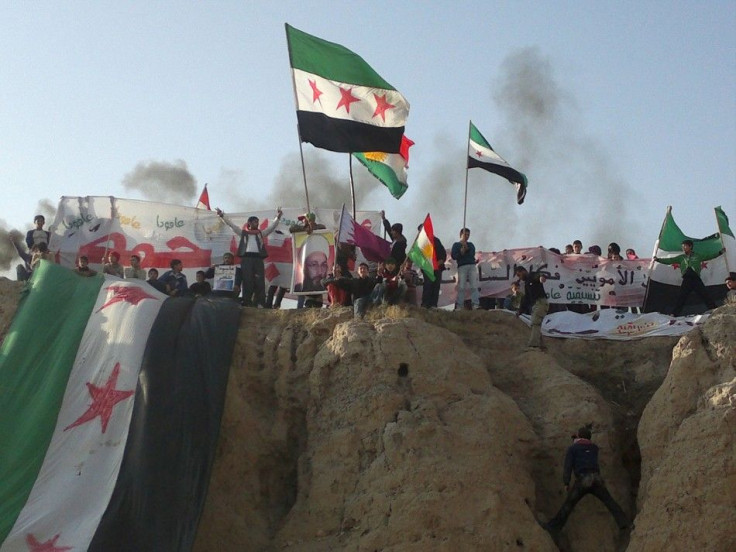8 More Killed in Syria as Arab League Considers Withdrawing Monitors

(Reuters) - An Arab League advisory body called for the immediate withdrawal of Arab monitors from Syria, where eight more people were reported killed on Sunday, saying their mission was allowing Damascus to cover up unabated violence and abuses.
President Bashar al-Assad's forces, keen to prevent huge public protests under the monitors' eyes, have killed at least 286 people since the mission began Dec. 23, according to local coordination committees who tally casualties.
Some of Sunday's eight deaths occurred when security forces fired on protesters in the Damascus suburb of Daria, they said.
The observer mission has already stirred controversy for its lack of numbers and comments by its Sudanese leader, General Mohammed al-Dabi, suggesting he was reassured by first impressions of Homs, one of the main centres of unrest.
The Arab Parliament, an 88-member advisory committee of delegates from each of the League's member states, said the violence was continuing to claim many victims.
For this to happen in the presence of Arab monitors has roused the anger of Arab people and negates the purpose of sending a fact-finding mission, the organisation's chairman, Ali al-Salem al-Dekbas, said.
This is giving the Syrian regime an Arab cover for continuing its inhumane actions under the eyes and ears of the Arab League, he said.
The monitors are supposed to check Syria's compliance with an Arab League plan that calls for a verifiable withdrawal of troops and heavy weaponry from towns and cities, the release of thousands of detainees and a dialogue with opposition groups.
Arab League Secretary-General Nabil Elaraby had said it should take only a week to see if Assad was keeping his word.
MONITORS VISIT DERAA
The presence of monitors has not affected the behaviour of the regime with hundreds killed and no let-up, said Rima Fleihan, from the opposition Syrian National Council.
The Arab Parliament was the first body to recommend freezing Syria's League membership in protest at the bloodshed.
Arab monitors visiting Deraa, a southern town viewed as the cradle of the nine-month-old revolt, went to the home of Sheikh Ahmad Hayasneh, elderly imam of the Omari mosque where the first big protests against Assad's 11 years in power erupted in March.
It was unclear if the monitors met Hayasneh, who residents say has been under house arrest for at least five months for his role in the movement to rid Syria of decades of Baathist rule.
Residents said thousands of people demonstrated in Deraa after midnight, chanting Allahu akbar (God is greatest) and the people want the downfall of the regime.
Activists say they have little faith in the Arab mission, which is still short of its planned strength of 150 members, who must observe events across a country of 23 million people.
And it relies for transport on state security escorts who some protesters say have prevented access to the demonstrators.
The team has been escorted with the governor and there is no way for anyone other than security personnel to get anywhere near them, said Ibrahim Aba Zaid, an activist from Deraa.
Dabi, the mission's leader, modified his initial comment that things in Homs were reassuring, but has since created more concern by appearing to undermine a statement made by one monitor in Deraa on a YouTube clip posted on Saturday.
We saw snipers in the town, we saw them with our own eyes, the observer says in Arabic, visibly concerned. We're going to ask the government to remove them immediately. We'll be in touch with the Arab League back in Cairo.
Dabi later told the BBC: This man said that IF he sees, by his eyes, those snipers, he will report them immediately and he will tell the government. But he didn't see, he said that 'IF he (sees)', so it is not correct in the media, what he said.
KEEP QUIET, MONITORS TOLD
In another incident, shown on Al Arabiya television, a monitor in the embattled neighbourhood of Bab Amro in Homs appealed to the authorities by telephone to stop firing there.
The perceived gap between Dabi's attitude and the concerns expressed by some of his team on the ground has prompted the Arab League to tell monitors to focus on their technical work and avoid public statements, a source at the League said.
Opposition groups are trying to create a coherent movement to build political pressure and to boost their credibility in the eyes of other countries that fear chaos if Assad is deposed.
The Syrian National Council, the main exile group, signed a post-Assad transition plan on Friday with the largely Syrian-based National Coordination Committee, according to Moulhem Droubi, a top SNC member from Syria's Muslim Brotherhood.
It is not clear how much sway the two groups have with the protesters. The document seen by Reuters says the deal will be presented to other opposition groups at a conference next month.
On New Year's eve, thousands of Syrians took to the streets in several cities and towns, including suburbs of Damascus, according to activists, residents and video posted online.
The Syrians want a modern regime in the New Year, read a placard carried by protesters in the capital's Qadam district.
Assad, 46, says Islamist militants steered from abroad are the source of unrest and have killed 2,000 of his forces. The United Nations says more than 5,000 people, mostly peaceful protesters, have been killed since the uprising began.
(Additional reporting by Mariam Karouny in Beirut and Ayman Samir in Cairo; Editing by Alistair Lyon)
© Copyright Thomson Reuters 2024. All rights reserved.





















